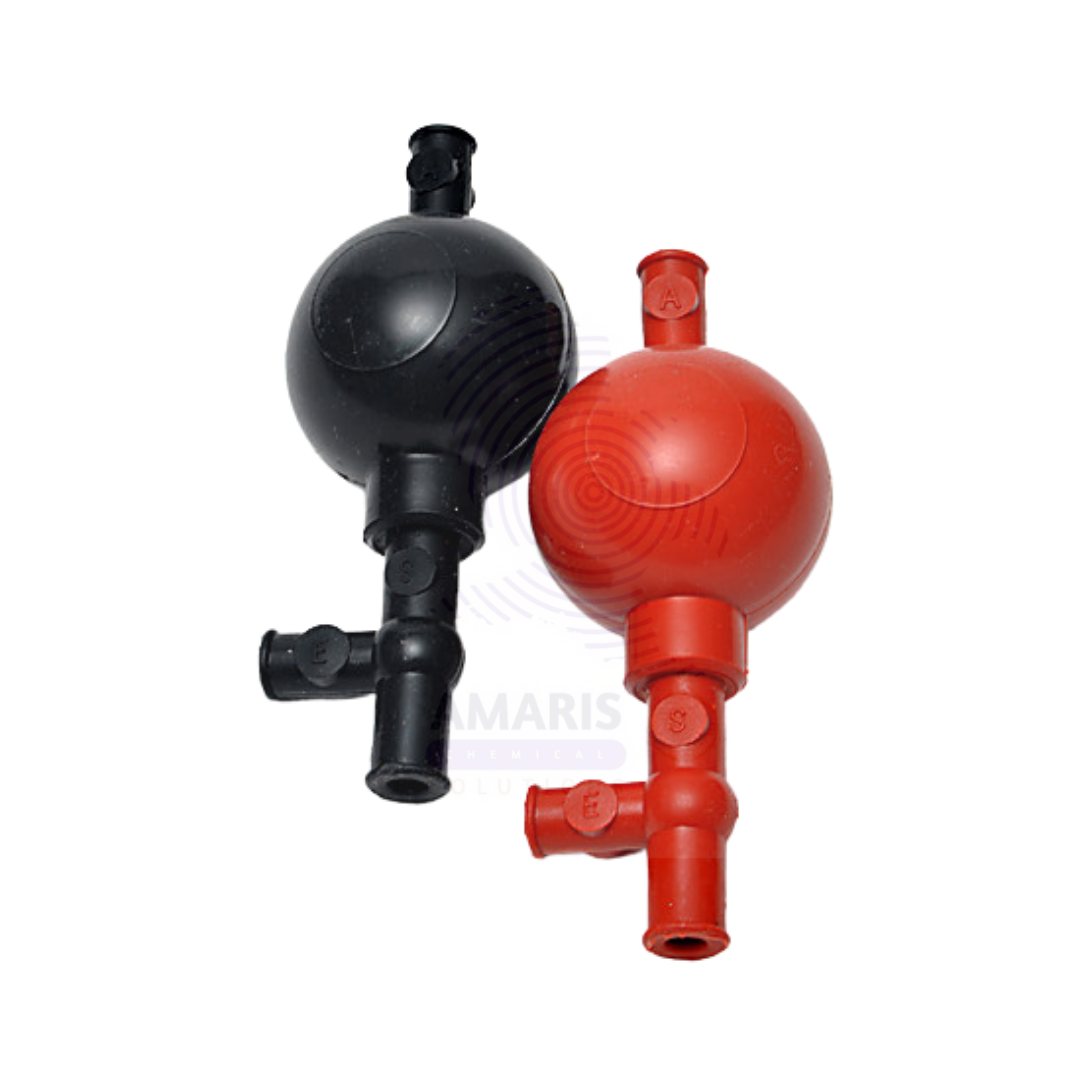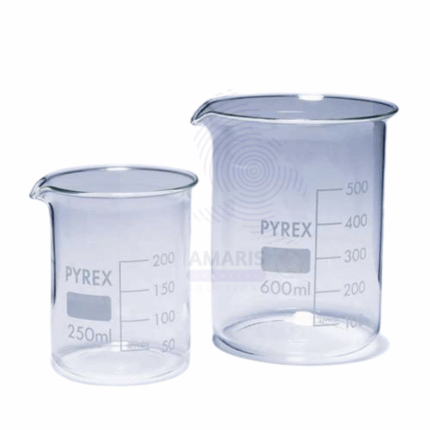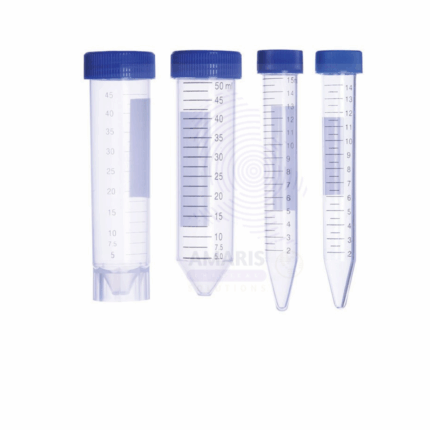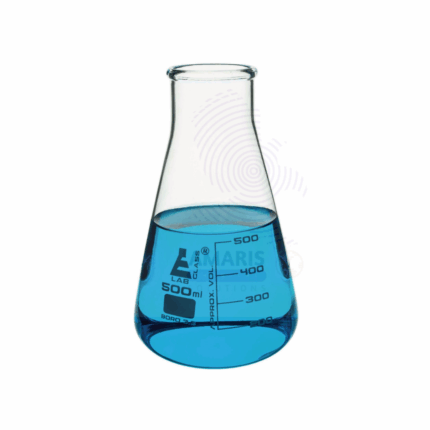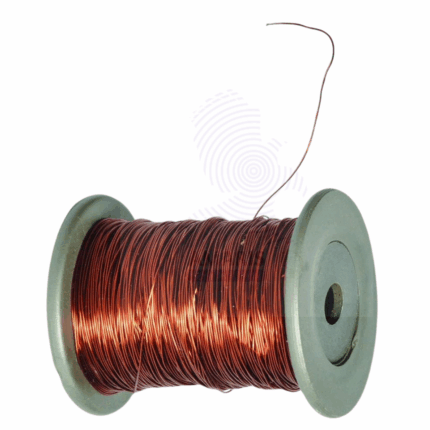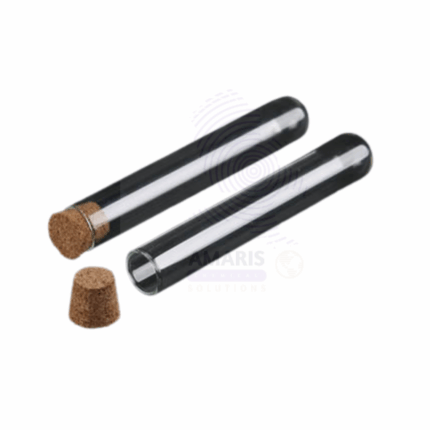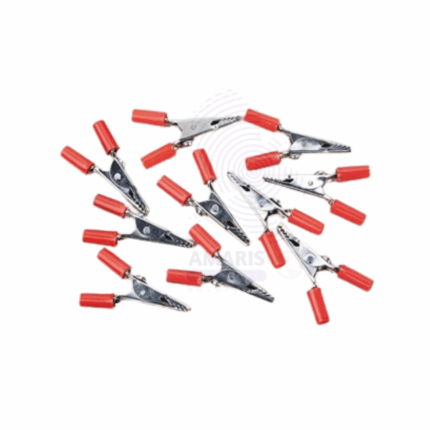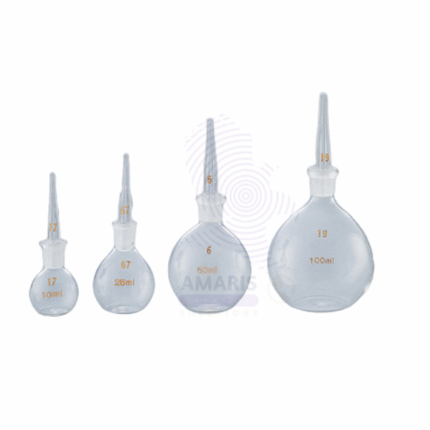“cork borer set sharpener” has been added to your cart. View cart
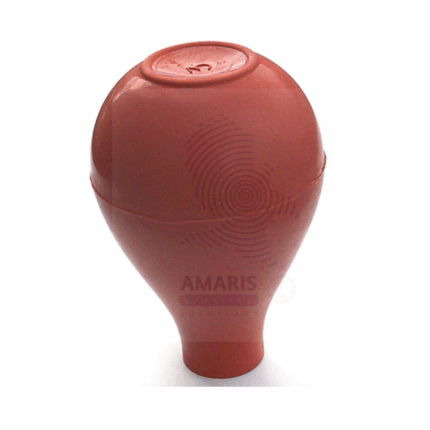
PIPETTE BULB
$ 7.20 Original price was: $ 7.20.$ 7.08Current price is: $ 7.08.
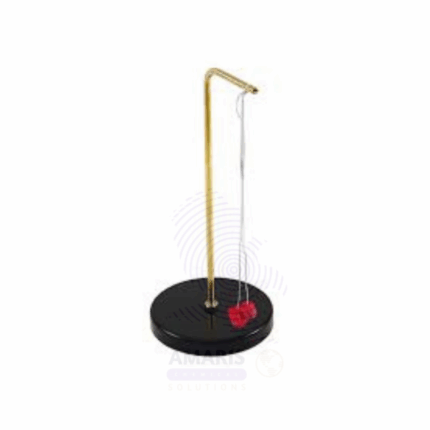
PITH BALLS ON STAND
$ 9.37 Original price was: $ 9.37.$ 9.29Current price is: $ 9.29.
PIPETTE FILLER BULB TYPE
$ 8.13 Original price was: $ 8.13.$ 8.07Current price is: $ 8.07.
Whatsapp Order
The Pipette Filler Bulb Type is a manual, rubber-based liquid handling accessory designed to provide safe and precise control over the aspiration and dispensing of liquids using pipettes. It is shaped like a bulb and typically includes one-way valves or a three-valve mechanism (Aspirate, Dispense, and Air Release) to regulate fluid movement. This tool eliminates the hazardous practice of mouth pipetting and ensures user safety when working with corrosive, toxic, or infectious substances. Compatible with both glass and plastic pipettes, the bulb-type pipette filler is widely used in educational, clinical, pharmaceutical, and analytical laboratories.
Description
Table of Contents
Toggle
PIPETTE FILLER BULB TYPE
Primary Uses
- Laboratory and Clinical Applications
- Drawing up and releasing accurate volumes of liquid into and from pipettes.
- Used in titration, reagent handling, and sample preparation in chemistry labs.
- Essential in pathology and diagnostic labs for transferring biological samples.
- Ensures contamination-free handling of hazardous or sterile liquids.
- Compatible with volumetric, graduated, serological, and Pasteur pipettes.
Secondary Uses
- Educational and Research Settings
- Teaching students proper, safe pipetting techniques in school and college labs.
- Assisting in sample handling and preparation in biochemical and microbiological research.
- Employed in research labs where precision fluid transfer is critical.
KEY PRODUCT FEATURES
1.Basic Identification Attributes
- Material: High-quality rubber or silicone.
- Structure: Bulb with integrated three-valve system (squeeze, aspirate, release).
- Design: Ergonomic for one-hand operation; tight fit over pipette neck.
- Compatibility: Fits most standard pipettes (1–100 mL).
2.Physical & Chemical Properties
- Elasticity: Flexible and durable under repeated use.
- Chemical Resistance: Resistant to acids, bases, alcohols, and most reagents.
- Precision Control: Allows fine adjustment of fluid intake and delivery.
- Colors: Often color-coded for size and chemical application.
3.Safety & Hazard Attributes
- Replaces unsafe mouth pipetting; greatly reduces exposure to harmful liquids.
- Non-breakable and easy to decontaminate after use.
- Reduces risk of sample cross-contamination.
4.Storage & Handling Attributes
- Store in a cool, dry area to prevent hardening or degradation.
- Rinse thoroughly after contact with aggressive chemicals.
- Periodically check for cracking or valve failure.
5.Regulatory & Compliance Attributes
- Compliant with OSHA, CDC, and laboratory biosafety regulations.
- Manufactured under ISO and quality assurance standards.
6.Environmental & Health Impact
- Reusable; lowers environmental impact compared to disposable alternatives.
- Non-toxic; no hazardous residue under normal usage.
SAFETY HANDLING PRECAUTIONS
Safety Handling Precautions
- Ensure firm attachment to pipette before operation.
- Avoid using with highly oxidizing agents that degrade rubber.
- Use gloves when handling biohazardous or corrosive samples.
First Aid Measures
- In case of contact with hazardous liquids, follow standard chemical exposure protocols.
- If chemical enters the eye during pipetting, flush immediately and seek medical attention.
Firefighting Measures
- Combustible rubber; keep away from flames and high heat.
- Use foam, CO₂, or dry chemical extinguishers in fire situations.
Related products
Beaker Pyrex
Beaker Pyrex is a high-quality laboratory container made from borosilicate glass known for its excellent thermal resistance, chemical durability, and mechanical strength. It is widely used for mixing, heating, and holding liquids in laboratories and industrial applications. Pyrex beakers can withstand rapid temperature changes without cracking, making them ideal for heating and cooling processes. They feature clear, transparent walls with easy-to-read graduated markings for volume measurement.
Centrifuge tubes
Centrifuge Tubes are specially designed containers used for holding samples during centrifugation. Made from high-quality, chemically resistant plastic or glass, these tubes withstand the high centrifugal forces generated during lab procedures. Available in various volumes and designs, including conical bottoms for easy sediment collection, centrifuge tubes are essential for separating components in biological, chemical, and industrial samples. They are compatible with a wide range of centrifuge models and ensure sample integrity and safety during processing.
Condenser liebig
The Liebig Condenser is a straight glass tube surrounded by a water jacket used to cool and condense vapors back into liquids during distillation processes. It is a fundamental laboratory apparatus designed for efficient heat exchange, allowing vapors to lose heat and convert back to liquid form. Constructed from durable borosilicate glass, the Liebig condenser withstands thermal stress and chemical corrosion, making it suitable for repeated use in various laboratory and industrial distillation and reflux applications.
conical flask
Conical flasks, also known as Erlenmeyer flasks, are widely used laboratory glassware characterized by a flat bottom, conical body, and a narrow neck. Made typically from borosilicate glass, they are designed to hold, mix, and heat liquids safely. The narrow neck helps reduce evaporation and splashing during experiments. Conical flasks are essential for titrations, culturing microorganisms, and general solution preparation in laboratories and industrial settings.
copper connecting wire
Copper Connecting Wire is a high-conductivity electrical wire used to establish electrical connections in laboratory and industrial setups. Manufactured from pure or high-grade copper, it ensures minimal resistance and maximum current transfer. The wire is typically insulated with flexible PVC or rubber to provide durability, flexibility, and protection. Available in various gauges and lengths, it is a critical component for assembling circuits, powering devices, and conducting experimental setups.
Cork to fit test tube
Cork to Fit Test Tube is a conical sealing component made from natural or synthetic cork, designed specifically to fit snugly into standard laboratory test tubes. It ensures a tight seal that prevents contamination, limits evaporation, and maintains sample integrity during storage or handling. Due to its compressible and chemically resistant structure, it is ideal for routine laboratory operations and industrial testing processes. These corks are available in various sizes to accommodate a wide range of test tube diameters and are compatible with both glass and plastic tubes.
Crocodile Clips
Crocodile Clips are versatile electrical connectors featuring serrated jaws to securely grip wires or terminals. Commonly made from copper or brass with a nickel or chrome plating, these clips ensure reliable conductivity and mechanical stability. Widely used in laboratory and industrial settings for quick temporary electrical connections, testing, and circuit prototyping.
Density Bottle
The Density Bottle is a precision glassware device used for determining the density of liquids by measuring a known volume and mass. Typically made from high-quality borosilicate glass, the bottle features a tight-fitting stopper with a capillary hole to allow excess liquid to escape, ensuring volume accuracy. It is commonly used in laboratory settings for experiments in physical chemistry, materials science, and industrial quality control processes. The device provides a reliable method for comparing the density of various substances with high repeatability.


 Preservatives(food)
Preservatives(food) Flavor Enhancers
Flavor Enhancers Acidulants
Acidulants Sweeteners
Sweeteners Antioxidants
Antioxidants Colorants(food)
Colorants(food) Nutraceutical Ingredients (food)
Nutraceutical Ingredients (food) Nutrient Supplements
Nutrient Supplements Emulsifiers
Emulsifiers
 Collectors
Collectors Dust Suppressants
Dust Suppressants Explosives and Blasting Agents
Explosives and Blasting Agents Flocculants and Coagulants
Flocculants and Coagulants Frothers
Frothers Leaching Agents
Leaching Agents pH Modifiers
pH Modifiers Precious Metal Extraction Agents
Precious Metal Extraction Agents
 Antioxidants(plastic)
Antioxidants(plastic) Colorants (Pigments, Dyes)
Colorants (Pigments, Dyes) Fillers and Reinforcements
Fillers and Reinforcements Flame Retardants
Flame Retardants Monomers
Monomers Plasticizers
Plasticizers Polymerization Initiators
Polymerization Initiators Stabilizers (UV, Heat)
Stabilizers (UV, Heat)
 Antifoaming Agents
Antifoaming Agents Chelating Agents
Chelating Agents Coagulants and Flocculants
Coagulants and Flocculants Corrosion Inhibitors
Corrosion Inhibitors Disinfectants and Biocides
Disinfectants and Biocides Oxidizing Agents
Oxidizing Agents pH Adjusters
pH Adjusters Scale Inhibitors( water)
Scale Inhibitors( water)
 Antioxidants(cosmetic)
Antioxidants(cosmetic) Emollients
Emollients Fragrances and Essential Oils
Fragrances and Essential Oils Humectants
Humectants Preservatives
Preservatives Surfactants(cosmetic)
Surfactants(cosmetic) Thickeners
Thickeners UV Filters
UV Filters
 Fertilizers
Fertilizers Soil Conditioners
Soil Conditioners Plant Growth Regulators
Plant Growth Regulators Animal Feed Additives
Animal Feed Additives Biostimulants
Biostimulants Pesticides (Herbicides, Insecticides, Fungicides)
Pesticides (Herbicides, Insecticides, Fungicides)
 Active Pharmaceutical Ingredients (APIs)
Active Pharmaceutical Ingredients (APIs) Excipients
Excipients Solvents(pharmaceutical)
Solvents(pharmaceutical) Antibiotics
Antibiotics Antiseptics and Disinfectants
Antiseptics and Disinfectants Vaccine Adjuvants
Vaccine Adjuvants Nutraceutical Ingredients (pharmaceutical)
Nutraceutical Ingredients (pharmaceutical) Analgesics & Antipyretics
Analgesics & Antipyretics
 Analytical Reagents
Analytical Reagents Solvents(lab)
Solvents(lab) Chromatography Chemicals
Chromatography Chemicals Spectroscopy Reagents
Spectroscopy Reagents microbiology-and-cell-culture-reagents
microbiology-and-cell-culture-reagents Molecular Biology Reagents
Molecular Biology Reagents Biochemical Reagents
Biochemical Reagents Inorganic and Organic Standards
Inorganic and Organic Standards Laboratory Safety Chemicals
Laboratory Safety Chemicals Specialty Laboratory Chemicals(Special Laboratory Equipment)
Specialty Laboratory Chemicals(Special Laboratory Equipment)
 Demulsifiers
Demulsifiers Hydraulic Fracturing Fluids
Hydraulic Fracturing Fluids Scale Inhibitors(oil)
Scale Inhibitors(oil) Surfactants(oil)
Surfactants(oil) Drilling Fluids
Drilling Fluids
 Dyes and Pigments
Dyes and Pigments Bleaching Agents
Bleaching Agents Softening Agents
Softening Agents Finishing Agents
Finishing Agents Antistatic Agents
Antistatic Agents
 Admixtures
Admixtures Waterproofing Agents
Waterproofing Agents Sealants and Adhesives
Sealants and Adhesives Curing Compounds
Curing Compounds Concrete Repair Chemicals
Concrete Repair Chemicals Anti-Corrosion Coatings
Anti-Corrosion Coatings
 Surfactants(cleaning)
Surfactants(cleaning) Builders
Builders Enzymes
Enzymes Solvents (Cleaning)
Solvents (Cleaning) Fragrances
Fragrances
 Electronic Chemicals
Electronic Chemicals Catalysts
Catalysts Lubricants
Lubricants Photographic Chemicals
Photographic Chemicals Refrigerants
Refrigerants Automotive chemicals
Automotive chemicals Pyrotechnic Chemicals
Pyrotechnic Chemicals
 Biodegradable Surfactants
Biodegradable Surfactants Bio-based Solvents
Bio-based Solvents Renewable Polymers
Renewable Polymers Carbon Capture Chemicals
Carbon Capture Chemicals Wastewater Treatment Chemicals
Wastewater Treatment Chemicals
 Pigments
Pigments Solvents(paint)
Solvents(paint) Specialty Coatings
Specialty Coatings Binders/Resins
Binders/Resins Additives
Additives Driers
Driers Anti-Corrosion Agents
Anti-Corrosion Agents Functional Coatings
Functional Coatings Application-Specific Coatings
Application-Specific Coatings
 Fresh Herbs
Fresh Herbs Ground Spices
Ground Spices Whole Spices
Whole Spices Spice Blends
Spice Blends Dried Herbs
Dried Herbs
 Leavening Agents
Leavening Agents Dough Conditioners
Dough Conditioners Flour Treatments
Flour Treatments Fat Replacers
Fat Replacers Decoratives
Decoratives Preservatives(baking)
Preservatives(baking)
 Plasticizers & Softeners
Plasticizers & Softeners Reinforcing Agents
Reinforcing Agents Adhesion Promoters
Adhesion Promoters Vulcanizing Agents
Vulcanizing Agents Antidegradants
Antidegradants Blowing Agents
Blowing Agents Fillers & Extenders
Fillers & Extenders Accelerators & Retarders
Accelerators & Retarders